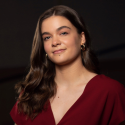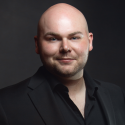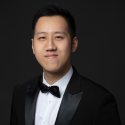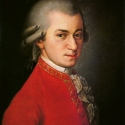The Secret Gardener

|
Emma MarhefkaSandrina |
Emma Marhefka, soprano, has country-wide performance credits including Lauretta (Gianni Schicchi) Opera Tampa, Younger Alyce (Glory Denied) Knoxville Opera and Opera Roanoke, and Frasquita (Carmen) Des Moines Metro Opera. She has been a young artist with Des Moines Metro Opera, Wolf Trap Opera, and Santa Fe Opera as cover for Adina (The Elixir of Love). While at CCM, Marhefka sang Susanna (The Marriage of Figaro), Mary Johnson (Fellow Travelers), The Vixen (The Cunning Little Vixen), and Sandrina (The Secret Gardener). She is a winner of The Metropolitan Opera’s 2025 Laffont Competition and a 2023 finalist in Houston Grand Opera’s Eleanor McCollum Competition.

|
Gabrielle SalomonSerpetta |
Gabrielle Salomon (she/her) is an avid performer and educator throughout the valley. Salomon participated in both her church and school choirs growing up which sparked her passion for music education. She continued to pursue her love for music at Arizona State University, earning degrees in Vocal Performance and Music Learning and Teaching. She is actively contracted with Arizona Opera as a chorister and Victory Lutheran Church as the soprano section leader. Salomon has extensive stage and concert performance experience. Recent credits include Mabel in The Pirates of Penzance and soprano soloist in Handel’s Messiah. She independently teaches private voice, piano, and ukulele lessons. Another passion of Salomon's is history, which she minored in with an emphasis on American History. Her favorite time period is the Gilded Age.

|
Meghan KasandersArminda |
Soprano Meghan Kasanders has been hailed by Opera News as “a wonderfully promising, rich dramatic soprano”. In the 2024/25 Season, she debuts with Chicago Opera Theater for a concert entitled Bohème and Beyond: The Legacy of Puccini. Last season she debuted with The Dallas Opera in Elektra (Fünfte Magd), Lyric Opera of Kansas City for Journey to Valhalla (Sieglinde), and the Dallas Symphony Orchestra for Das Buch mit sieben Siegeln conducted by Fabio Luisi. Kasanders also presented a recital produced by Carnegie Hall Citywide in New York City and took part in the workshop of Working for the Macbeths (Lady Macbeth) with American Lyric Theater.
Past engagement highlights include debuts at Virginia Opera in Die Walküre (Sieglinde), and Opera Columbus in Don Giovanni (Donna Anna), with returns to Staatsoper Hannover for Hänsel und Gretel (Gertrud), Opera Columbus for Fellow Travelers (Mary Johnson), and Opera Theatre of Saint Louis for Gianni Schicchi (Nella) and The Magic Flute (First Lady). On the concert stage Kasanders made her debut with the Lubbock Symphony in Beethoven’s Symphony No. 9 and returned to Des Moines Metro Opera as guest soloist in A Concert for Robert.
She debuted the title role in Anna Bolena with Baltimore Concert Opera and made her European debut in Hänsel und Gretel (Gertrud) with Staatsoper Hannover. Kasanders made her Carnegie Hall debut singing in Bernstein's Songfest with the Juilliard Orchestra under the direction of Marin Alsop and debuted at Opera Saratoga in their critically acclaimed production of The Consul (Magda). She also performed Sibelius’ Luonnotar, Barbara Hannigan conducting, in Alice Tully Hall (NYC) and Don Giovanni (Donna Anna) at The Juilliard School. Kasanders is a 2019 Grand Finalist in the Metropolitan Opera National Council Auditions and both the First Prize and Audience Choice Winner in Dallas Opera Guild Vocal Competition. She has also been recognized by the Gerda Lissner Foundation, the Opera Birmingham Vocal Competition (Second Prize and Audience Choice), and the Mildred Miller International Voice Competition, where she won first prize in 2017 as the youngest competitor.
Kasanders’ training has included past resident artist apprenticeships with International Meistersinger Akademie (Neumarkt, Germany), Opera Theatre of Saint Louis, Des Moines Metro Opera, Opera Saratoga, and Dolora Zajick’s Institute for Young Dramatic Voices. Kasanders holds a Bachelor of Music degree from Simpson College, a Master of Music degree from Rice University, and an Artist Diploma in Opera Studies from The Juilliard School, where she was the recipient of The Richard F. Gold Career Grant.

|
Sedona LiberoRamiro |
Mezzo-soprano Sedona Libero is recognized for her authenticity, playfulness, and passion on the operatic stage. She made her professional debut as Dinah in Bernstein’s Trouble in Tahiti with the Great Lakes Chamber Music Festival, and her symphonic debut as the Alto Soloist in Mozart’s Requiem with the Ann Arbor Symphony Orchestra.
In 2025, she joined the Glimmerglass Festival as a Resident Artist for its 50th Anniversary season, performing in the World Premiere of Derek Bermel’s The House on Mango Street. She has also appeared as a Studio Artist with Teatro Nuovo (covering Romeo in I Capuleti ed i Montecchi), a Young Artist with Opera Southwest (Ernestina in L’occasione fa il ladro), and an Emerging Artist at the Seagle Festival (Rosie Chaney in The Manchurian Candidate and Carmen in La tragédie de Carmen).
Libero is a member of Arizona Opera’s Marion Roose Pullin Studio (2024-2026). An active performer in her home state of Arizona, she has appeared as Rosina in The Barber of Seville with Valley Opera Company and served as a Teaching Artist for a season with Arizona Opera’s OperaTunity tour. She holds degrees from the University of Michigan (M.M.) and Northern Arizona University (B.M.).

|
Sam KrauszBelfiore |
Sam Krausz is quickly gaining notice as a young tenor with “shining security” (Opera Today). Most recently engaged as a young artist at Des Moines Metro Opera and Wolf Trap Opera, Krausz’s professional work includes performing the Fourth Jew in Strauss’s Salome (DMMO), and covering Don Ottavio in Mozart’s Don Giovanni (WTO). Competition credits include a 2023 Regional Encouragement Award at the Metropolitan Opera Laffont Competition, as well as the 2023 national semi-finals of the Lotte Lenya Competition. After his undergraduate work at CCM, graduate roles at Northwestern University include Tamino (The Magic Flute), Oronte (Alcina), and David (Jake Heggie’s If I Were You).
Originally from St Louis, MO, Krausz aspires to be a champion of acoustic storytelling throughout his career. His most recent young artist credits include the Fourth Jew in Strauss’s Salome with Des Moines Metro Opera, and Apollo in Händel’s Semele at Wolf Trap Opera, where he also covered the role of Don Ottavio in their Filene Center production of Don Giovanni. Krausz made his concert debut singing Mozart’s Requiem in 2022 with the Berkshire Lyric Chorus and Orchestra, and he has also appeared before the Apollo Chorus of Chicago and the Cincinnati Vocal Arts Ensemble. Competition credits include a 2023 Central Region Encouragement Award in the Metropolitan Opera Laffont Competition, participation in the semi-finals of the 2023 Lotte Lenya Competition, and the finals of the National Opera Association Argento Competition. He was trained at the University of Cincinnati College-Conservatory of Music (BM) and Northwestern University (MM), where his graduate roles included Tamino (The Magic Flute), Oronte (Alcina), and David (Jake Heggie’s If I Were You). A pianist from a young age, Krausz has become a sought-after vocal coach for young singers while living in the Cincinnati area, even co-directing one of the nation’s only high school opera scenes programs.

|
Brad BickhardtPodesta |
Praised for his “healthy and soaring tenor voice” (Herald Times) and “brilliant physical grace, timing, and precision” (Broadway World), Korean-American tenor Brad Bickhardt is becoming known for his versatility in both opera and musical theatre. This season, he will sing the role of Podesta in La finta giardiniera with Arizona Opera. He also will make a return to Opera Theatre of St. Louis to sing Glenn in the World Premiere of This House by Ricky Ian Gordon and Lynn Nottage, and cover Snout in A Midsummer Night's Dream and Dr. Blind in Die Fledermaus. During the 2025/26 Season he will perform the role of Alfredo in La traviata with Livermore Valley Opera, Rinuccio in Gianni Schicchi at Anchorage Opera, and cover Goro in Madama Butterfly at the Lyric Opera of Chicago.
During the 2023/24 Season, he created the role of Felix in the World Premiere of Greg Kallor’s Frankenstein, and appeared as Don Ottavio in Don Giovanni and as Tybalt in a new production of Roméo & Juliette directed by Patricia Racette with Arizona Opera, and in the summer, he made a company debut with Opera Theatre of St. Louis as A Priest in Philip Glass’ Galileo Galilei directed by James Robinson.
Recent roles with Arizona Opera include Tamino in The Magic Flute, and role debuts as the Tanzmeister & Scaramuccio in a new production of Ariadne auf Naxos and Jumper in The Falling and the Rising. Bickhardt also reprised his Nemorino in The Elixir of Love with Muddy River Opera and created the role of Colin in the World Premiere of We Wear the Sea Like a Coat and sang Basilio/Curzio in The Marriage of Figaro with Opera Ithaca.

|
Yichen XueNardo |
Yichen Xue is a baritone from Anshan, China. In 2023, he was the recipient of Opera Index Competition’s Emerging Artist Award and, subsequently in 2024, received a Career Bridges grant. Xue was also a 2024 finalist and grant winner in the renowned Gerda Lissner Competition. Xue graduated from the Manhattan School of Music and received his Master’s degree from Hunter College, where he was a student of Ron Raines. In summer of 2024, he joins Wolf Trap Opera as a Studio Artist, followed by a residency with Arizona Opera as a Marion Roose Pullin Studio Artist where he will make his company debut as Schaunard in La Bohème.

|
Brian DeMarisConductor |
Equally at home in opera, musical theatre, symphony, ballet and pops, and involved with the development of over two dozen new works, Brian DeMaris has led productions with Anchorage Opera, Arizona Opera, Opera Columbus, El Paso Opera, Mill City Summer Opera, Syracuse Opera, Tri-Cities Opera, Charlottesville Opera, American Lyric Theatre and American Opera Projects. He has served as Principal Conductor of Anchorage Opera, Music Director of Mill City Summer Opera, and was previously associate conductor of the New York City Opera, assistant conductor at Florida Grand Opera and Glimmerglass Opera, and served on the music staff of Opera Theatre of Saint Louis. He has led concerts with the St. Cloud Symphony, Music St. Croix, the Lancaster Symphony Orchestra, Williamsburg Symphony Orchestra, Syracuse Symphoria, and the Israel Chamber Orchestra, and has performed at the United Nations, the Aspen Music Festival, Boston’s Jordan Hall, New York’s Le Poisson Rouge, Jazz at Lincoln Center, Symphony Space, Alice Tully Hall, and in recitals, competitions, and master classes throughout the United States and abroad. Previously Director of Opera and Musical Theatre at Ithaca College, he has served as Professor and Artistic Director of Music Theatre and Opera at Arizona State University since 2015.
DeMaris has also taught at Aspen Music Festival, New England Conservatory School of Continuing Education, Lawrence University, George Mason University’s International Opera Alliance, the International Vocal Arts Institute in Tel Aviv, and “Meet the Artist” at Lincoln Center. He has served on numerous panels with Opera America and the National Opera Association, and presented master classes with the National Association of Teachers of Singing, New York State Music Teachers Association, New York State School Music Association and the Arizona Music Educators Association. He has presented master classes at numerous universities and programs across the U.S., and his students have performed on Broadway, film and television, and at opera companies and festivals throughout the world. He also serves as Arizona Governor of the National Opera Association and Director of the Arizona District Metropolitan Opera Laffont Competition.
A frequent performer and advocate of contemporary music, he conducted the Middle Eastern premiere of Mark Adamo’s Little Women with the Israel Chamber Orchestra at the International Vocal Arts Institute in Tel Aviv, as well as the World Premiere of Stefan Weisman’s Darkling with American Opera Projects at the Classical Stage Company with additional performances in Gniezno, Poland, at Frei Universität in Berlin, Germany, the New York City Opera VOX Festival and the United Nations. He also leads the World Premiere recording of Darkling, released on Albany Records in 2011. DeMaris was also involved with the professional American premiere of Richard Rodney Bennett’ s Mines of Sulphur at Glimmerglass Opera, as well as the World Premieres of Peter Ash’s The Golden Ticket and John Corigliano’s revised version of The Ghosts of Versailles at Opera Theater of Saint Louis, for which he provided assistance with the preparation of the published piano-vocal score through G. Schirmer. He has worked with Beth Morrison Projects and American Lyric Theater in New York, through which he has done several workshops of new works including The Golden Ticket at Jazz at Lincoln Center, Adam and Eve at Symphony Space and Why Is Eartha Kitt Trying To Kill Me at Le Poisson Rouge. He has produced developmental workshops of more than a dozen new works at Arizona State University with professional collaborators including American Lyric Theatre, Beth Morrison Projects, and The Phoenix Theatre Company. DeMaris is also a composer himself: his musical The Portrait of Dorian Gray received a developmental workshop at Ephrata Playhouse in the Park in 2003, and his art songs have been performed in recitals throughout the United States. His 2022 album Gratitude features his complete songs for voice and piano.

|
Madeleine SnowStage Director |
Madeleine Snow is a director and creative collaborator who is passionate about reimagining ways for contemporary audiences to engage with classical music. She has enjoyed directing site-specific performances and collaborating with composers including Ricky Ian Gordon and Ben Moore. She directed the World Premiere of Joshua Hershfield’s critically acclaimed rock musical Rise and won second place of the 2023 American Prize in Directing for her inventive production of La Calisto with Eastman Opera Theatre. A 2024 Festival Artist at Central City Opera, Snow has recently worked as a director at PAC NYC, Palm Beach Opera, Boulder Opera, Loveland Opera Theatre, Rochester Philharmonic, Boston Youth Symphony, and Harvard College Opera.

|
Wolfgang Amadeus MozartComposer and Libretto The Secret Gardener |
Wolfgang Amadeus Mozart was born on January 27, 1756, in Salzburg, Austria. Mozart's father, Leopold Mozart, a noted composer, instructor, and the author of famous writings on violin playing, was then in the service of the archbishop of Salzburg. Leopold and Anna Maria, his wife, stressed the importance of music to their children. Together with his sister, Nannerl, Mozart received such intensive musical training that by the age of six he was a budding composer and an accomplished keyboard performer. In 1762 Leopold presented his son as performer at the imperial court in Vienna, Austria, and from 1763 to 1766 he escorted both children on a continuous musical tour across Europe, which included long stays in Paris, France, and London, England, as well as visits to many other cities, with appearances before the French and English royal families.
Mozart was the most celebrated child prodigy of this time as a keyboard performer. Mozart also made a great impression as a composer and improviser. In London, Mozart won the admiration of musician Johann Christian Bach (1735–1782), and was exposed from an early age to an unusual variety of musical styles and tastes across Europe.
From the age of ten to seventeen, Mozart's reputation as a composer grew to a degree of maturity equal to that of most older established musicians. Mozart spent the years from 1766 to 1769 at Salzburg writing instrumental works and music for school dramas in German and Latin, and in 1768 he produced his first real operas: the German Singspiel Bastien und Bastienne. Despite his growing reputation, Mozart found no suitable post open to him; and his father once more escorted Mozart, at age fourteen (1769), and set off for Italy to try to make his way as an opera composer.
In Italy, Mozart was well received: in Milan, Italy, he obtained a commission for an opera; in Rome he was made a member of an honorary knightly order by the Pope; and at Bologna, Italy, the Accademia Filarmonica awarded him membership despite a rule normally requiring candidates to be twenty years old. During these years of travel in Italy Mozart produced his first large-scale settings of opera seria: Mitridate (1770), Ascanio in Alba (1771), and Lucio Silla (1772), as well as his first string quartets. At Salzburg in late 1771 Mozart renewed his writing of Symphonies (Nos. 14–21).
Paris was a vastly larger theater for Mozart's talents. His father urged him to go there, for "from Paris the fame of a man of great talent echoes through the whole world," he wrote his son. But after nine difficult months in Paris, from March 1778 to January 1779, Mozart returned once more to Salzburg, having been unable to secure a foothold and depressed by the entire experience, which had included the death of his mother in the midst of his stay in Paris. Unable to get hired for an opera, Mozart wrote music to order in Paris, again mainly for wind instruments: the Sinfonia Concertante for four solo wind instruments and orchestra, the Concerto for flute and harp, other chamber music, and the ballet music Les Petits riens. In addition, Mozart began giving lessons to make money.
Mozart's years in Vienna, from age twenty-five to his death at thirty-five, cover one of the greatest developments in a short span in the history of music. In these ten years Mozart's music grew rapidly beyond the realm of many of his contemporaries; it exhibited both ideas and methods of elaboration that few could follow, and to many, the late Mozart seemed a difficult composer.
The major instrumental works of this period bring together all the fields of Mozart's earlier activity and some new ones: six symphonies, including the famous last three: no. 39 in E-flat Major, no. 40 in G Minor, and no. 41 in C Major (the Jupiter —a title unknown to Mozart). Mozart finished these three works within six weeks during the summer of 1788, a remarkable feat even for him.
In the field of the string quartet Mozart produced two important groups of works that completely overshadowed any he had written before 1780: in 1785 he published the six Quartets (K. 387, 421, 428, 458, 464, and 465) and in 1786 added the single Hoffmeister Quartet (K. 499). In 1789 he wrote the last three Quartets (K. 575, 589, and 590), dedicated to King Frederick William (1688–1740) of Prussia, a noted cellist.
Mozart's development as an opera composer between 1781 and his death is even more remarkable, perhaps, since the problems of opera were more far-ranging than those of the larger instrumental forms and provided less adequate models. The first important result was the German Singspiel entitled Abduction from the Seraglio (1782). Mozart then turned to Italian opera. Mozart produced his three greatest Italian operas: The Marriage of Figaro (1786), Don Giovanni (1787), and Cosi fan tutte (1790). In his last opera, The Magic Flute (1791), Mozart turned back to German opera and produced a work combining many strands of popular theater and including musical expressions ranging from folk to opera.
On concluding The Magic Flute, Mozart turned to work on what was to be his last project, the Requiem. This Mass had been commissioned by a benefactor said to have been unknown to Mozart, and he is supposed to have become obsessed with the belief that he was, in effect, writing it for himself. Exhausted, Mozart managed to finish the first two movements and sketches for several more, but the last three sections were entirely lacking when he died. It was completed by his pupil Franz Süssmayer after his death, which occurred in Vienna, Austria, on December 5, 1791.




